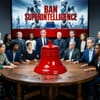The article outlines that a wide coalition of AI researchers, public figures and celebrities have signed an open letter calling for a prohibition on the development of “superintelligent” AI systems—defined as those that would significantly surpass human cognitive abilities. The letter is organised by the Future of Life Institute (FLI) and states that development should not proceed “before there is broad scientific consensus that it will be done safely and controllably, and strong public buy-in.”
According to the coverage, over 800 signatories have added their names, including prominent AI pioneers such as Geoffrey Hinton and Yoshua Bengio, Apple co-founder Steve Wozniak, Virgin Group founder Richard Branson, as well as public and cultural-figure signatories like Prince Harry and Meghan Markle.The concern is that the pace of AI advances could outstrip societal, regulatory and safety mechanisms, potentially leading to scenarios of loss of human control, economic disruption or worse.
The article also discusses the tension inherent in the call: while many agree that current AI innovations (e.g., generative systems) offer major benefits, there is alarm about the “race” toward systems that might self-improve, operate autonomously and thus fall outside human oversight. It highlights the practical challenge of how one might achieve “strong public buy-in” and “broad scientific consensus,” given the competitive, global, and capital-intensive nature of AI development today.
In summary, the piece signals a growing moment of reckoning in the tech world: even as many companies push ahead with AI research, a significant bloc of experts and public-facing figures are calling for a pause or at least a profound recalibration of the trajectory. Whether the call will translate into enforceable regulation, industry norms or global cooperation remains open.


